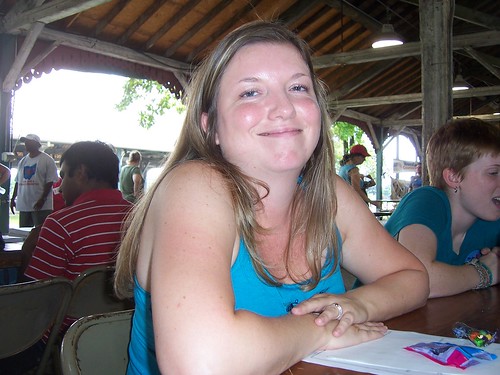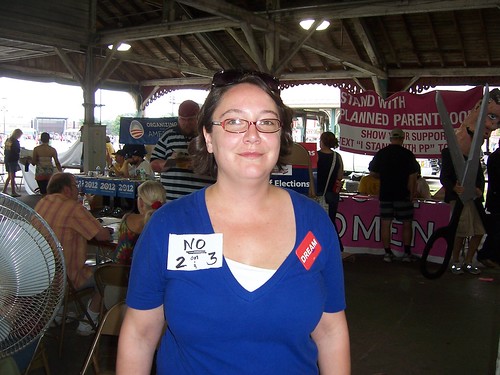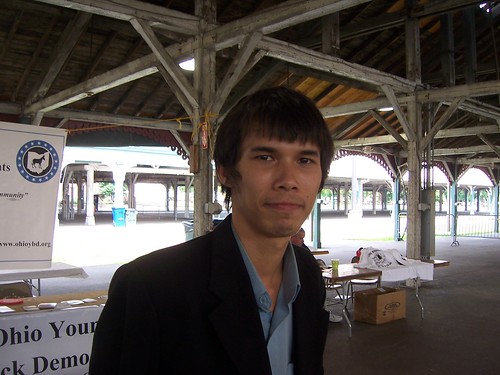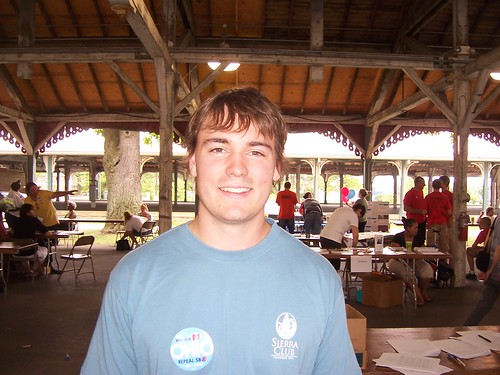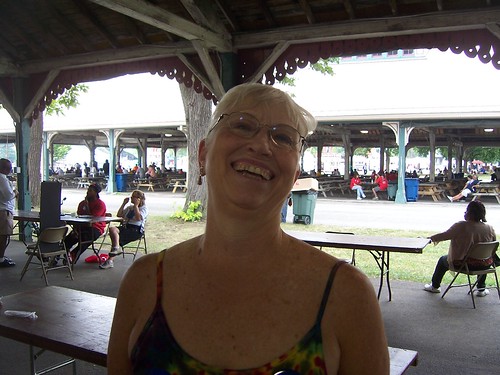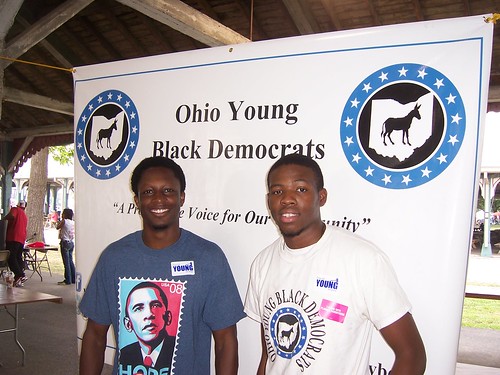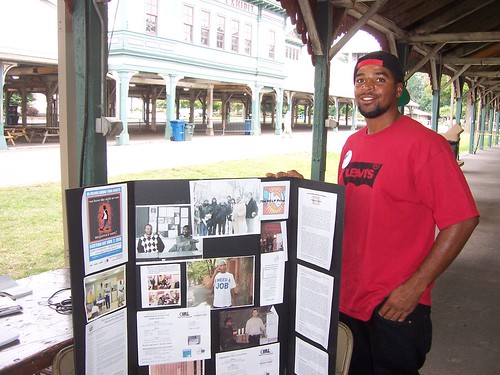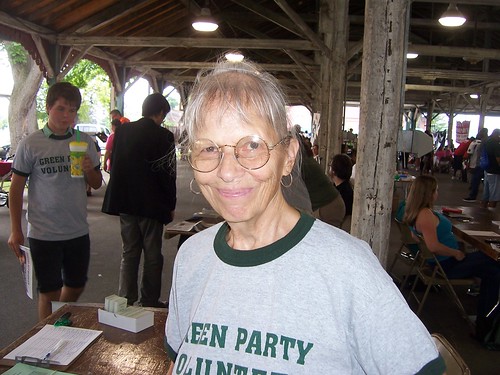WCRS Podcast - What You Care About
Activist Deb Steele on building alliances, voter suppression, privatizing OSU, and expelling Sodexo from Columbus Public Schools
20:08 minutes (18.44 MB)
Steele has worked w/ Greenpeace and served as Outreach Director at Jennifer Brunner For Senate. She is currently an organizer w/ Columbus Jobs With Justice. She spoke w/ us at the Stand Up For Ohio festival on Aug. 20.
A ‘disorientation guide’ for incoming OSU freshmen (and freshwomen)
She is helping Ohio State University students form a chapter of the Progressive Student Coalition.
“We just sort of need more progressive groups coming together. The Progressive Student Coalition is the feminists, the environmentalists, the worker rights student groups coming together to get more bang for our activism energy.”
Those students did an event at OSU on May 5 of this year called Live Against Five, at which they gathered about 300 signatures to add to the petition drive that put the repeal of Ohio House Bill 5 up to a vote this fall.
The OSU Progressive Student Alliance currently is working on the ‘Disorientation Guide’ to give to incoming freshman.
“It’s about the realities of the politics of the city we live in and the reality of Gordon Gee acting pretty cushy w/ corporations.”
Privatizing our land grant university ?
“There are murmurs of him wanting to privatize Ohio State University in the near future,” said Steele.
She said there is currently money going to charter universities that should be going to public universities.
- Login to post comments
- Read more
- Download audio file
Rachel Radina is a Miami U graduate student and an activist fighting against the privatization Ohio's state universities
2:39 minutes (2.43 MB)
Rachel Radina is a graduate student working w/ Miami University Defend Ohio
“We’re concerned about the push to privatize our public universities in Ohio. Chancellor (Jim ) Petro put out a report last week or a plan to create charter or what they’re calling ‘enterprise universities’ now,” said Radina.
Here is what that plan would do, according to Radina.
“In exchange for less state funding, they would get less state regulations, which we know is not good for vulnerable populations such as students and workers. So they’d have the ability to increase tuition and increase class size. That means less quality education, but it’s going to cost more money. So it’s kind of like a backdoor tax on Ohio families.”
Radina said the report also calls for the ability to partner w/ corporate entities.
“That could create a situation where professors have to do research for corporate interests instead of for the public good. So, we’re concerned about all of these issues and we don’t really know what the final plan will look like. But we want to be included in the conversation. That’s why we here today to let the public know that these talks are going on behind closed doors, and that if we don’t do something about it, our universities will be private and less accessible to working families.”
Radina said legislators are going to be forming committees to change Petro’s plan and then create legislation. <<>>>
“It’s in the process. He (Petro) has created a plan. Now it’s in legislators’ hands. Legislators will make changes and that will be sent out to be made into legislation. We’re not really sure what it will look like. At this point, we just have Petro’s plan which you can access online.”
- Login to post comments
- Read more
- Download audio file
Christine Kozobarich of Ohio Communities United talks about building alliances among progressive activists
4:28 minutes (4.09 MB)
Christine Kozobarich recently joined Ohio Communities United as a lead organizer.
She agreed that environmentalism and social justice activism should be combined in order to build a bigger movement.
“That’s a very good way to come together for people who care about progressive issues. Sometimes we get so entrenched in our own issue that we’re working on at the moment that we don’t step back and see how it’s connected to things other people are working on.”
Kozobarich said building alliances that bring together a variety of causes reflects the reality of every day life.
“As Ohioans, we all need healthcare. We all need good jobs. We all need safe, secure communities. We all need a healthy environment to live in and raise our children in…We’re not one-issue communities.”
She said events such as the Stand Up For Ohio festival are ways for people to find common cause w/ one another, instead of being divided and conquered w/ wedge issues.
- Login to post comments
- Download audio file
Hutchinson Persons of the International Socialist Organization on defeating right-wing extremism
6:04 minutes (5.56 MB)
We spoke w/ Persons at the Stand Up For Ohio festival on Aug. 20. I asked him for his opinion on how to build a grass roots movement to defeat right-wing extremism.
“ There’s a lack of theoretical background for a lot of organizations where they focus on one issue, but they don’t see the entire picture.”
Persons, who heads an OSU student chapter of the International Socialist Organization, emphasizes the broader picture.
“ We work in solidarity with every issue, but we realize that without the entire picture, we’re not going to get real change. If we can work for more theoretical backing w/ other organizations and work together that way, there would be a more efficient left coalition.”
Getting to what he regards as the heart of the matter, Persons said “working people should not be afraid to work together and call it what it is : a class war.”
The OSU chapter of the International Socialist Organization is comprised mostly of students and faculty, but is open to the public. It works w/ Jobs With Justice and labor unions here in Central Ohio, as well as immigrant rights groups and queer advocacy groups such as Equality Ohio.
To those democrats and progressives wary of being associated w/ avowed socialists, Persons said, “Socialists have been on the ground from the beginning. In every grassroots movement, you’ll find socialists. You can’t avoid us. We’re going to be there to struggle w/ people.”
- Login to post comments
- Download audio file
Ben Wickizer of the Ohio Sierra Club says transportation choice is both an environmental and social justice issue.
6:06 minutes (5.58 MB)
When I suggested it, Wickizer agreed environmental and social justice issues are linked.
“We’re seeing attacks on and plundering of our environment, while we’re also seeing attacks on organized labor and the basic needs of individuals in the middle class and working class…So it’s great we can come together and unite and work together on some of these issues.”
Columbus will be part of an international event called Bike to the Future, http://biketothefuture.org/ . The ride involves a festival at Franklin Park from noon to 4 on Sept 24.
“Please come out and celebrate w/ us and recognize the importance of this issue,” said Ben Wickizer who works w/ the Ohio chapter of the Sierra Club.
And on Sept 12, the film Contested Streets will be shown at 7:30 at the South Campus Gateway, followed by a discussion led by local transportation experts.
“Transportation choice is what we’d like to see more of in this state. We’d like to see municipalities and the state in general adopt Compete Streets policies.” http://www.completestreets.org/
- Login to post comments
- Download audio file
Pat Marida of the Ohio Sierra Club is part of the fight to stop hydraulic fracturing or 'fracking'.
7:30 minutes (6.87 MB)
“They’ve been using hydraulic fracturing for obtaining natural gas for years. However, this new process is much deeper. It’s going down more than a mile. It’s going down into shale bedrock, well below the water table. They’re actually putting in much water down below our fresh water. They’re adding some of 596 chemicals we’ve found they are using.”
Marida said natural gas companies are exempt from the Clean Water Act, as well as the . Clean Air Act and the Safe Drinking Water Act. But added to those environmental issues are labor issues.
‘These natural gas companies, they’re not hiring union members. They’re hiring non-union truckers. Many trucks are used in this process to haul the water, the drilling rigs, and then haul away the toxic water. What once was fresh water is now toxic They’re able to extract about half of it from the ground. The rest is left in the ground.. The people who know about this process know that they gas companies are lying about the safety of it.”
Marida said if people are interested in getting involved, they can email Matt Trokan. His email address is matt.trokan@sierraclub.org
The pavilion at the Ohio State Fair Grounds reminded me of a small bizarre where various organizations had their booths and tables. Marida said there is a common cause that could ally the groups.
“It’s the takeover of America by large monetary interests, corporate interests. We think it’s the takeover also by a few greedy political interests that are working in concert w/ multinational corporations. They want to pollute. They don’t want to hire union people and they don’t want the democratic process to work.”
- Login to post comments
- Read more
- Download audio file
Dwayne Pickett of Ohio Young Black Democrats on voter suppression, food deserts, and attacks on Head Start
7:01 minutes (6.43 MB)
From left, Humphrey Wireco and Dwayne Pickett. Ohio Young Black Democrats meets every third Wednesday of the month at the Ohio Democratic Party headquarters in Columbus where they organize and meet w/ elected officials.
Pickett said one of the biggest issues for his organization this year is voter suppression.
“You see it all over the right wing across the United States. They’re talking about voter fraud …but they got no evidence that it’s ever taken place.”
His group is working w/ other groups on a petition effort to repeal Ohio HB 194 which Governor John Kasich signed into law in July.
According to Ohio Daily Blog there is just a little over five weeks to collect the 231,000 valid signatures needed to qualify the repeal for the November 2012 ballot, thereby preventing HB 194 from going into effect until after that election, (if it’s not repealed.)
If the petition effort doesn’t meet that goal, Ohio HB 194 will affect people’s ability to vote this fall on matters such as the repeal of Ohio Senate Bill 5.
In addition to helping w/ the fight to repeal HB 194, Ohio Young Black Democrats is talking at college campuses to help people plan ahead so as to overcome the possible restrictions on voting.
Pickett said Ohio Young Black Democrats works on a variety of issues important to some of the most vulnerable people in society, such as children of low-income households.
“ Head Start is under attack right now. They talk about Head Start, ‘oh, this is discretionary spending.’ To them (Republicans), Head Start is pork, more fat to help democrats get reelected . But it’s not about reelection. It’s about kids---actual lives.”
- Login to post comments
- Read more
- Download audio file
James Lunsford works w/ The Help Project to assist men returning from prison.
3:41 minutes (3.37 MB)
“Basically, what we do is we try to help guys who have a criminal background record find relevant employment. So, whether that’s helping them w/ their driving situation or getting some of their cases expunged, we try to do those certain things that help them make it to that job.”
Lunsford said The Help Project is involved in advocacy, in addition to offering services.
“On a lot of these different issues and policies you got going on in Ohio or wherever it may be, we attack those issues.”
The Help Project partners w/ the Amos Project, the Ohio Justice and Policy Center, and other organizations
- Login to post comments
- Download audio file
Tekla Lewin supports the Green Party
- Login to post comments
- Download audio file
How do we protect community gardens from 'theft' and vandalism in ways that don't alienate nearby residents ?
2:34 minutes (2.36 MB)
Columbus Eastside resident Melvin Harris disapproves of a no trespassing sign and the newly placed fence at the large garden at Mound and Carpenter run by Four Seasons City Farm.
"There's no reason to put a fence around something that should belong to the whole community," Harris said.
He said he's never seen a fence around a community garden.
" I don't think that's fair to anyone in the neighborhood, especially (during) the times we're going thru now w/ people losing jobs and having problems paying their rent and getting food on the table for themselves and their kids."
Harris said people in this East Side neighborhood should be able to go to the garden and pick some vegetables w/o having to deal w/ a fence, so long as they help w/ some of the work.
After I had packed up my recording equipment, long-time community gardener Daniel Ingwersen arrived to the garden site.
He pointed out to Harris (and me also) that a portion of the garden was left unfenced, so that people in the neighborhood still had some crops, such as collard greens, which they could harvest whenever they want, regardless of whether they've helped w/ the garden.
- Login to post comments
- Read more
- Download audio file


